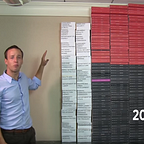Let the Market (and Parents) Regulate Education
Regulations not only hamper economic growth, but they are also prohibitive to the growth of many other valuable features of society. This includes K-12 education. Research centers like the OECD and the Pew Research Center have showed a stark trend of stagnation across all areas of study when observing American students. What could be causing this stagnation?
In a recent article for U.S. News, Howard Baetjer Jr., Patrick McLaughlin, and Stephen Strosko look to answer this question.
The authors discuss two main points. First, there should be a distinction made between government regulation and market regulation, but both are still forms of regulation. It is important to remember that market competition can be a strong form of regulation. The authors explain, “Believe it or not, regulation need not originate with legislation or be carried out top-down by government agencies. Regulation occurs continuously in a competitive marketplace, bottom-up, without any government intervention.”
A second point is suggested by the quote above. Regulation is either top-down or bottom-up. Top-down regulations are regulations made by individuals that lack information about the people or objects that they are regulating. On the other hand, bottom-up regulations are made by individuals who have more specific knowledge over the people or objects that they are regulating.
When it comes to education, parents regulating their children’s schooling from the bottom is considerably more effective than the national government regulating from the top. Why regulate so indirectly?
Let parents regulate education directly. The key is for parents, not government bureaucrats, to decide what schools their children attend and, therefore, what schools receive their money. Schools that are successful will receive more funding and more students, while those that are less successful will have to improve or go out of business. That sounds like regulation that works.
